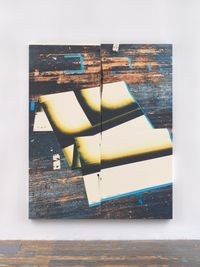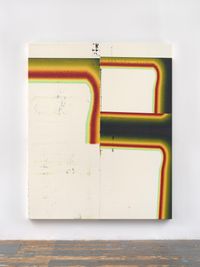

Galerie Chantal Crousel is pleased to announce an exhibition of new paintings by Wade Guyton. This is the artist's fourth show at the gallery. The last one was four years ago.
Some of the imagery is familiar: a studio floor; enlarged bitmap files; recent news captured from the New York Times website; paintings in process lying on the floor; a chair sculpture; a view from the studio on a rainy day. In addition, there are close- ups of other paintings and ink runs, caning from a Breuer chair, and a deer found washed ashore. This time around the paintings are wetter and the colours more saturated. And layers drift from one painting to another.
For the exhibition the artist had added two windows to the gallery.
John Kelsey writes:
In one of his new paintings, Wade Guyton returns the New York Times online interface to an inky materiality which many contemporary viewers won't have experienced firsthand. We know this news is digital because some of the articles are dated '2 minutes ago.' Meanwhile, it's funny to read 'Today's Paper' on the canvas, as if the algorithmically engineered information we consume by the minute was still dreaming that its physical, daily body hadn't long since vanished. Here, Guyton gives the news a new body, gloriously plastic and real, raked with hyper-saturated colours he's amped in Photoshop by forcing the curves and saturation levels of the screenshot image. News about Macron and Trump, the weather and data theft arrives drippingly vivid in the paintings. As if materialising an unseen dimension of the refresh function: cognitive dissonance, dread, and our own disappearance within the interface. What does abstraction look like today? Where does information end and painting begin? And if we've stopped believing the news is true, can we agree that it's beautiful again?
The colours in these works are not always chosen by the artist but often result from algorithmic and gestural interference, accidents proliferating between the digital layers and the material moments of his process. These are paintings composed of both content and accident. As Guyton exposes his images to varying degrees of noise, he reveals and welcomes what is unplanned, unthought and unconsumed in contemporary experience. Meanwhile, amid the digital interference and the material chaos of running ink, a memory of modernist aesthetics persists in the artist's penchant for regular, rectangular forms. 'Windows' of digital and painterly information are rotated 90 or 180 degrees, or flipped. The canvas itself is a modern survivor, and here Guyton sticks to his standard 84 X 69-inch format. One painting is based on an image of a Breuer chair's woven cane seat, while in another, the chrome tube is freed from its iconic form. A killed deer is doubled on one canvas, recalling Warhol's equation of seriality and death. And now, half a century after Warhol, mechanical reproduction feels weird again. Market metrics and quantified scaling have invaded every image and every human experience. Experience itself is mechanically reproduced and mediated... predicted, targeted, scaled, distributed. Whatever remains of the artwork's aura is now steeped in doubt and dread. And Guyton finds way to make even this beautiful, or at least vivid.
The artist has organised his own feedback loop at his Bowery studio: photos taken of still-wet works are sent back through Guyton's process, fed back into the algorithms and returned via Epson printers as new paintings, which are then sometimes photographed in turn. Opening the otherwise closed system of his aesthetic machine to interference at each step of his process, Guyton continuously generates surprise and unplanned beauty. It's a rigorous system until it glitches or breaks down. Rigour and glitch, in every image. It's a self-documenting process, feeding itself back into itself until something new is seen. The bodies of the artist and his team are all involved, and the old creaky floorboards of the studio continue to appear alongside the monochrome bitmaps and other abstract noise. All this becomes hyper-present in its moment of vanishing. Vanishing itself is made vivid before our eyes.
Wade Guyton (b. 1972, Hammond, IN) has presented work in many solo institutional exhibitions, the latest of which was a twenty-year retrospective at the Museum Ludwig, Cologne (2019). Other important solo shows have been hosted by institutions such as the Serpentine Gallery, London (2017); Museum Brandhorst, Munich (2017); Museo MADRE, Naples (2017); MAMCO, Geneva (2016); Le Consortium, Dijon & Académie Conti, Vosne-Romanée (2016); Kunsthalle Zürich (2013); Whitney Museum of American Art, New York (2012-2013); Museum Ludwig, Cologne (2010); Museum Dhondt-Dhaenens, Deurle (2009); Portikus in Frankfurt am Main (2008); and the Kunstverein in Hamburg (2005). He lives and works in New York.
Press release courtesy Galerie Chantal Crousel.
10 rue Charlot
Paris, 75003
France
www.crousel.com
+33 142 773 887
+33 142 775 900 (Fax)
Tuesday - Friday, 10am - 6pm
Saturday, 11am - 7pm